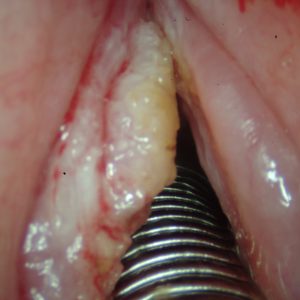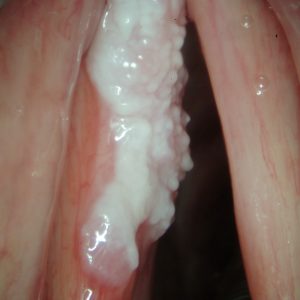Laryngeal cancer is a type of throat cancer that affects the voice box (larynx). It can develop when abnormal cells in the vocal cords grow uncontrollably, forming tumors. The exact cause is not always known, but smoking, heavy alcohol use, and exposure to certain chemicals can increase the risk. Symptoms often include a persistent hoarse voice, difficulty swallowing, and a lump in the throat. Doctors use specialized tools, like video stroboscopy (a procedure that uses a strobe light to examine the vocal cords), to examine the vocal cords and determine whether the cancer is affecting only the surface or has spread deeper into the tissue.
When laryngeal cancer is found early, it can be treated by An ear, nose, and throat (ENT) surgeon. These specialists are trained to diagnose and treat conditions of the head and neck, including the larynx. They can treat this with minimally invasive procedures. One standard method is transoral laser surgery, where a surgeon carefully removes the affected tissue using a laser. If the cancer is more advanced, deeper layers of the vocal cords may need to be removed, which can impact the voice. Radiation therapy is another treatment often used for early cancer. Stroboscopy helps doctors decide how much tissue to remove while preserving as much voice function as possible. In some cases, more extensive surgeries like a partial or total laryngectomy (removal of part or all of the voice box) may be needed.
Recovery from laryngeal cancer is a journey that depends on the type and extent of treatment. While patients may experience temporary hoarseness for minor procedures, they can return to normal activities fairly quickly. For those who undergo more significant treatments, such as the removal of a portion of the vocal cords, voice therapy becomes a crucial part of the recovery process. This therapy not only aids in speech but also instills hope and optimism for a restored voice. Avoiding smoking and alcohol, following a healthy diet, and attending regular check-ups are essential for preventing recurrence. Remember, early detection and treatment give the best chances of preserving the voice and overall health.

Cancer

Verrucous Cancer

Pre-cancer

 YouTube Channel
YouTube Channel
